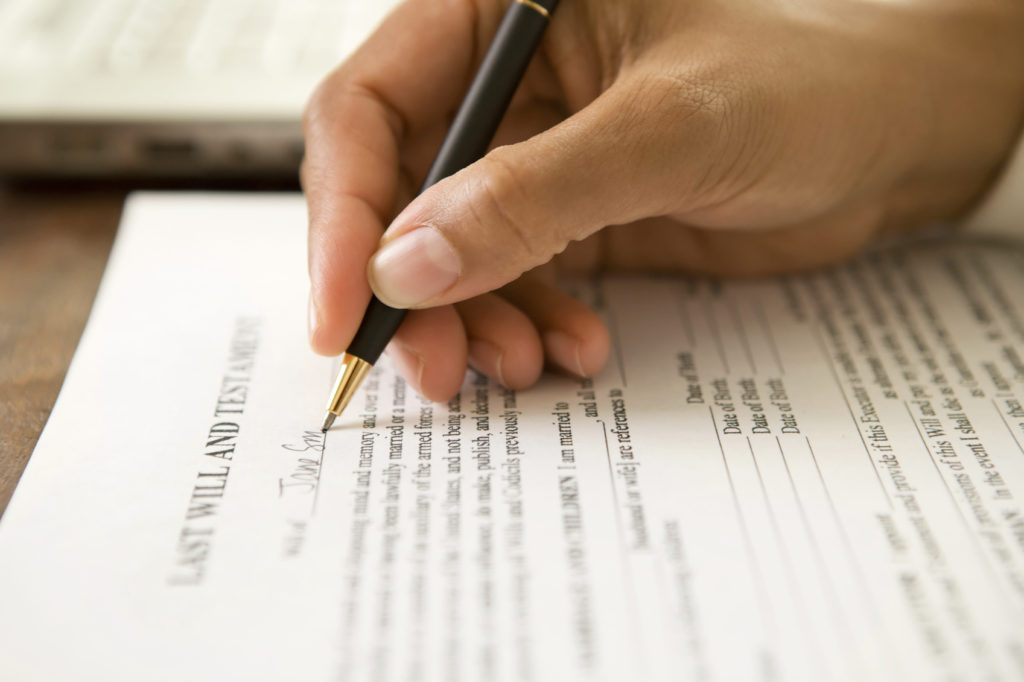
Considerable time and thought is given to the planning of a Will. For most people, putting together their Will is an important way to provide for their family and ensure the division of assets in a way that is fair and meaningful.
Ideally, a Will should be updated regularly to account for changing circumstances, such as additional children, a new spouse or newly acquired property. It may be simple and precise or a very detailed document, providing clear instructions for individual items and the distribution of assets. In any case, a Will is an important document to have in place.
While Will disputes may seem confined to the pages of an Agatha Christie novel or a Hollywood film, there are situations in real life that call for a Will to be challenged. Upon the death of a loved one, finding out that their Will does not align with what you know of their wishes, their character or relationships can come as a shock.
Disputes involving a Will are complicated, in part due to the inherent sensitive and emotional nature of such a conflict, in addition to the intricacy of the law that governs this area. It is therefore important to understand what challenging a Will actually means and when it applies.
What Does It Mean to Challenge a Will?
When a Will comes into play, it needs to be approved by the court for a ‘Grant of Probate’. Probate is proof of the Will and gives an executor authority to distribute the estate according to that Will. When questions arise as to the validity of a Will, it may be ‘challenged’ in court.
It is important to note that challenging a Will is different to ‘contesting’ a Will. When a Will is contested, the validity of a Will is accepted, and disputes arise if one or more persons feel they have not been provided for by the deceased and these claims are Family Provisions Claims.
Who Can Challenge a Will?
The law recognises we live in an age of complicated family structures and blended families. As a result you do not have to be a direct relative of the deceased to challenge a Will. De-facto partners (including same sex partners), former spouses, stepchildren, other dependents, members of the deceased’s household or those in a close personal relationship with the deceased may challenge a Will. As individual situations vary, it’s helpful to seek advice from an experienced estate law solicitor who can advise if you are eligible to challenge a Will or not.
When Can You Challenge a Will?
The law sets out certain criteria for a valid Will. In order for a Will to be valid it must comply with the criteria set out under the Succession Act 2006. This criteria, among other things, states that the Will must be in writing, signed by the Will-maker along with two witnesses, and the Will-maker must have ‘testamentary capacity’. Testamentary capacity means the Will-maker knows the legal effect of a Will; they are aware of the extent of their assets and the people who would normally expect to benefit from the estate; and they are not prevented by mental illness or disease to make rational decisions regarding the Will.
A Will can be challenged if it does not meet the criteria set out under the Succession Act 2006. For example, a Will that is not signed by the Will-maker may be challenged on grounds of forgery, or where testamentary capacity is compromised a Will may be challenged on grounds of fraud or lack of mental capacity on the part of the Will-maker. In addition to forgery, fraud and a lack of mental capacity, a Will may be considered invalid if there was undue influence in the Will-making process from someone who stands to gain substantial benefit.
Grounds For Challenging a Will
Grounds for challenging a Will vary, but those mentioned above are the most common. It’s important to understand the meaning of each, as the process for challenging a Will is largely determined by the grounds on which it is challenged.
Undue Influence
Undue influence may occur when the person who assisted the deceased in drawing up the Will stands to gain from doing so. The Will may be challenged if it is suspected that person used pressure, threat, force or intimidation during the Will-making process to influence its contents. For example, questions may arise if an elderly woman leaves her entire estate to one grandchild who helped her draw up her Will, despite equal relationships with all her other grandchildren.
If the Will is challenged then it falls on the person who assisted the deceased to prove there was no undue influence during the Will-making process. However, a challenge on grounds of undue influence can only be successful if the court is satisfied that the deceased’s mind and thought process was coerced to the point of making the resulting Will in contradiction of what their true intentions would have been. For example, if the same elderly woman had a particularly close relationship with the grandchild who helped her draw up her Will and estranged relationships with her other grandchildren then it may be assumed that a Will leaving her entire estate to that one grandchild was not contradictory of what her true intentions would have been.
Lacked Mental Capacity
If the Will-maker lacked the mental capacity to create a valid Will, then it may be challenged on these grounds. For example, the Will of an elderly man created while he was suffering from dementia may be invalid. In order to challenge a Will on these grounds, the challenger must prove that the deceased, at the time of creating the Will, was suffering from: a medical condition that resulted in a reduced mental capacity; senility; or they were under the influence of alcohol, drugs or another substance that reduced their mental capacity. It must be shown that the Will-maker didn’t have ‘testamentary capacity’ when executing their Will.
Fraud
Fraud occurs when there is deception in the Will-making process. For example, a person is tricked into signing a Will. For example, they may have thought they were signing another document, or perhaps they were presented with false statements regarding their estate and as a result the Will does not accurately reflect their wishes. Fraud is difficult to prove and the party challenging the Will needs to present evidence that the Will was indeed signed under false pretenses.
Forgery
A forged Will can be one of two things. In the first instance a Will may be entirely forged, including the contents of the Will and signature. In the second instance, the Will may have been created by the deceased, but the signature has been forged. In both cases, it is the challenger who Will need to prove forgery. Evidence may include the testimony of a handwriting expert, an earlier Will, a draft and witnesses.
What Happens if a Will is Successfully Challenged?
If a Will is challenged successfully then the Will in question Will be disregarded. The deceased’s estate Will be distributed according to their last valid Will, or if no valid Will exists, the estate Will be distributed according to intestacy law (those laws which determine who is entitled to an estate under rules of inheritance).
Do You Need a Lawyer to Challenge a Will?
There are limited circumstances under which a Will can be challenged, and successfully challenging a Will certainly requires the expertise of a professional estate law solicitor. In most cases, the burden of proof falls on those challenging the Will so it is important to work with a team who understand the legal requirements and necessary evidence. In addition to legal expertise and experience, a lawyer who understands the emotional complexities of such a case Will be valuable.
At Taylor & Scott Lawyers, the team of estate law solicitors are experts in Wills, probate, and estate litigation. Over the years they have represented many clients and achieved successful outcomes in matters of Will disputes. The decision to challenge a Will isn’t easy and many people may feel uncomfortable to do so, however time limits do apply when challenging a Will. It is therefore important to seek professional legal advice as soon as possible, even if you feel slightly uncomfortable about the execution of a loved one’s Will, it is better to investigate sooner rather than later.
Discuss your case with an experienced estate law solicitor at Taylor & Scott who can advise if the Will in question can be challenged as well as the subsequent steps that should be taken. They can also offer advice on other ways in which to dispute a Will if challenging a Will isn’t the right legal avenue. Call 1800 600 664 today or complete a contact form here.
At Taylor & Scott “We Care For You”.



